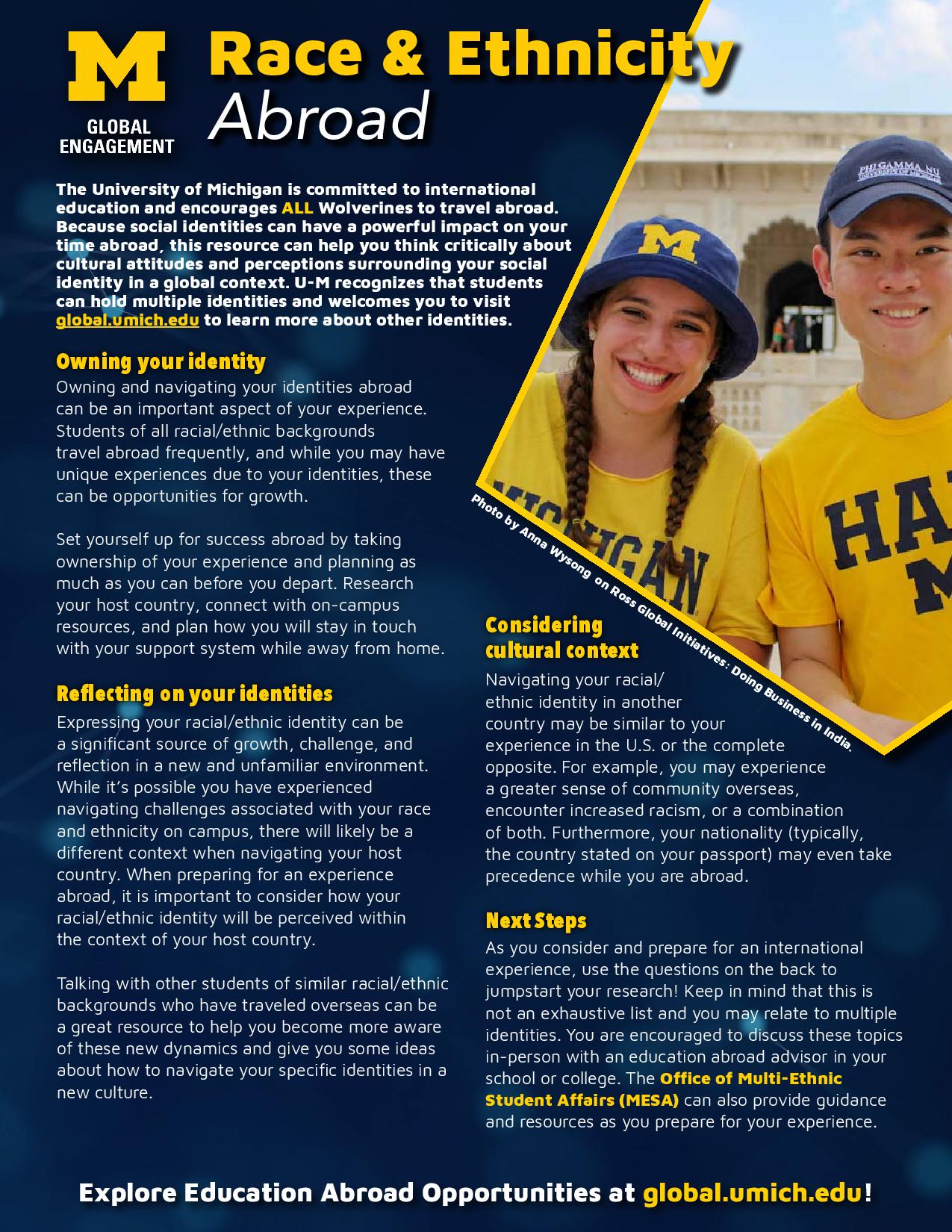Race & Ethnicity Abroad
Introduction
As race and ethnicity are experienced, viewed, and understood differently around the world, your racial/ethnic identity might have a different impact on your day to day and overall experience in your host country than it does in the U.S. While some students from minority racial/ethnic backgrounds in the U.S. find it freeing to be outside of the context of American race relations, other students may find the need to utilize coping strategies as they encounter familiar and new forms of prejudice. Some students might find themselves becoming a racial minority for the first time and may deal with bias that they have never experienced. Whether your racial/ethnic identity falls into the majority or the minority here in the U.S, it’s important to think about how this part of your identity might factor into your experience abroad.
Opportunities and Challenges You May Face
If you are moving from the minority to the majority you may feel especially welcomed in your host country as you see those from your racial/ethnic background identified and widely-represented as the norm. While abroad you receive looks of adoration, curiosity, or confusion because of your perceived racial/ethnic background. People might attempt to touch your skin or hair, before or without asking for consent, or ask questions about your race/ethnicity that you find to be insensitive or offensive. Though the people who engage in these interactions with you might have different intentions, it is important to think about your comfort levels and how you might react to such experiences. While some students are open to turning these encounters into learning experiences, other students prefer to disregard or disengage from such situations. Reach out to IPE or utilize the resources below as you conduct your research and formulate your potential response.
Preparing Yourself
While you should not go abroad expecting to experience racism or discrimination, it is important to be prepared in case an incident does occur. The best way to do this is by investigating the cultural practices and social norms that exist in your host country prior to departure. You may find that your race or ethnicity might make your transition into your host country more or less difficult than that of students who identify differently. Alternatively, you might find that your nationality takes precedence and your ethnic/racial identity will be secondary.
As you research matters related to race and ethnicity in your host country, consider the following questions:
Questions to Consider/Action Items
Before Departure
- What are the demographics of your host community, specifically the racial/ethnic minorities and majorities?
- Which groups have power and privilege?
- How does this compare to the United States?
- How might the above impact how you will be perceived in your host country?
- Historically or currently, are there any laws or attitudes in your host country related to people who share your racial or ethnic identity?
- How are people with the same racial or ethnic identity as you treated in-country?
- How many students with similar racial/ethnic backgrounds usually participate in this program?
- If opting for a host family, do you know if your host family has housed minority students before? Will this be an issue for them?
- How will you react if you encounter racism or discriminatory behavior?
- If you face racial or discriminatory incidents, who will you contact?
Resources
- Your IPE Advisor can direct you to resources regarding your specific home country and intended study abroad program/country
- U-M International Center can help answer questions regarding your U.S. visa, I-20, and maintaining your status while abroad.
- The Trotter Multicultural Center can support you as you seek to understand how to effectively engage across differences.
- CGIS Guide for Racial and Ethnic Identities Abroad
- GE – Link when new is available?
- Diversity Abroad aims to serve the needs of diverse and underrepresented students in the field of international education. On their website you can find their Diversity and Inclusion Abroad guide, as well as articles written by diversity abroad students.
- Plato Underrepresented Students Resources Contains links to organizations, resources, and scholarships that support academic advancement for underrepresented groups.
- AllAbroad.us is a website advocating for increased participation and diversity in study abroad


